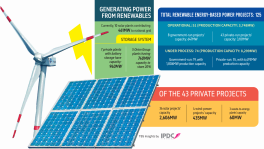Space, the new investment hotspot
The complex world of space is opening up for business, and a good balance in capital, strategic partnerships and evolving business models is needed for success

Space is attracting serious investment, with interest in exploring business options on the extraterrestrial soil showing an upward trend.
Investment in the space startup scene has accelerated over the years, with investors putting in more and more money in such companies.
Venture capitalists poured $3.25 billion into space technology in 2018, according to a report of Seraphim Capital, a London-based space-focused venture fund.
Meanwhile, a Space Angels report said funding until the second quarter of 2019 reached 88% of the total figure of 2018. Comparing first half of 2019 with the corresponding period in 2018, total investment has increased by 65% year-on-year, driven by corporate and venture capital inflows.
Space Angels is an American venture capital firm focused on the space economy.
In 2018, space startup equity investment was $2.97 billion and until the second quarter of 2019, the figure reached $2.9 billion, according to Space Angels.

Musk, Bezos big shots of space investment
Silicon Valley superstar Elon Musk has always been at the forefront of working with state-of-the-art technologies.
His space transportation services company, SpaceX, was valued at $33.3 billion in the end of May this year, surpassing market capitalisation of his electric car company Tesla. He has a 54% stake in SpaceX.
Musk invested more than $100 million to get SpaceX off the ground in 2002. SpaceX successfully launched 60 Starlink satellites into orbit recently, and has raised more than $1.02 billion since the beginning of 2019.
SpaceX is working on a multibillion-dollar rocket called the "Starship" that could one day take people to the moon, Mars, and launch thousands of satellites into orbit, Business Insider reported in August.
Musk thinks the human race needs to be backed up to Mars where a sustainable colony can be built. The Starship is key to all of that.
Amazon chief Jeff Bezos, who is the world's richest person, is investing much of his Amazon fortune in his space programme, Blue Origin. He recently sold Amazon stocks worth $1.8 billion and pumped the money into Blue Origin.
Bezos said he sells roughly $1 billion worth of stocks a year to fund Blue Origin. He has pledged to sell more than $1 billion this year as Blue Origin gets closer to commercial operations.

Blue Origin is working on space tourism, and developing rockets for satellite launches and space exploration, much like its rival SpaceX.
Self-sustaining ecosystem key to success
Even though investment in space operations is growing, success in this area demands a self-sufficient ecosystem.
Practical business cases and realistic profit models are part of the ecosystem that are of necessity, says Morgan Stanley, an American investment banking firm.
Also, the launch business is a fundamental part of the space ecosystem because that is the first step towards travelling to space.
It is also the single largest area of investment activity, totalling between $1.3 billion and $1.6 billion in 2018, according to estimates from Space Angels and Seraphim Capital.
The launch companies are continuously trying to put a dent in the cost of launch. They are working to make it cheaper, easier and faster.
Launch is something that will enable the rest of the ecosystem, from satellites to services, to ultimately grow into a broader marketplace.
"The launch companies are depending on the small and medium satellite manufacturers. The manufacturers are relying on the services companies, who are focused on things like satellite broadband, low-earth-orbit imaging and weather monitoring, and then the loop feeds back on itself," said Phillip Ingle, a managing director in the Investment Banking arm of Morgan Stanley.
The launch business is currently generating a lot of attention. The large launch companies are competing with the traditional government providers.
Space Angels defines heavy launch as systems for launching payloads of 20,000-50,000kg that include entry and landing systems.
"But there is also a lot of activity on the small launch side – companies who are focused on launching smaller, lower-cost satellites into orbit," said Ingle.
"Some of these launch companies are already profitable, as there is increasing demand to launch small satellites."
Ingle observed that space is tremendously complex and it is going to take time for the ecosystem to develop.
Multi-party initiative
It is not only the government that is in the space race. Angel investors, private equity firms and a new band of startups formed in the last few years are doing their part to explore what future space holds in terms of business.
"Much of the interest shown in this area is real passion in the industry. But candidly, some of it is simply fear of being late to the party. Things are changing at such a rapid pace that investors are saying they have to keep up with the times," said Ashley MacNeill, Co-Head of Technology Equity Capital Markets for Morgan Stanley.
Space is a complex world of heavy machinery, proper infrastructure and skilled manpower. Also, it requires huge capital both in the research and development phase and during the time infrastructure is built.
This dawning economy requires patience on the side of investors as returns might come after as many as 50 years.

MacNeill said investors are increasingly relying on permanent and long-term capital funds, which is a good sign.
NASA (North American Space Agency), NOAA (National Oceanic and Atmospheric Administration), the US Department of Defense and other government agencies are still the biggest clients in the emerging space business.
"The successful companies will tell you that, at this stage, the government is still critical. The startups are going to need time to develop business models that work," said Ingle.


 Keep updated, follow The Business Standard's Google news channel
Keep updated, follow The Business Standard's Google news channel
















